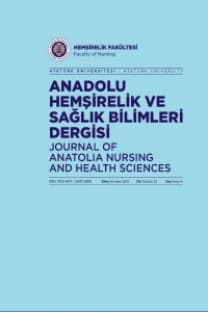KARACİĞER SİROZU VE BESLENME TEDAVİSİ
Liver cirrhosis and nutrition therapy
___
- Amodio P, Bemeur C, Butterworth R, Cordoba J, Kato A, Montagnese S et al. The nutritional management of hepatic encephalopathy in patients with cirrhosis: International Society for Hepatic Encephalopathy and Nitrogen Metabolism Consensus. Hepatology 2013; 8(1):325-36.
- Bémeur C, Butterworth R F. Reprint of: Nutrition in the Management of Cirrhosis and its Neurological Complications. Journal of Clinical and Experimental Hepatology 2015; 5:131-40.
- Cabre E, Gassull MA. Nutrition in liver disease. Current Opinion in Clinical Nutrition & Metabolic Care 2005; 8(5):545-51.
- Cheung K, Lee S S, Raman M. Prevalence and mechanisms of malnutrition in patients with advanced liver disease, and nutrition management strategies. Clinical Gastroenterology and Hepatology 2012; 10(2): 117-25.
- Dam G, Ott P, Aagaard NK, Gluud LL, Vilstrup H. Branched Chain Amino Acids and Blood Ammonia. In: Rajendram R, Preedy VR, Patel VB eds. Branched Chain Amino Acids and Blood Ammonia. In Branched Chain Amino Acids in Clinical Nutrition. 1 st ed., New York: Humana Press; 2015: p. 101-12.
- da Silveira, T. R. Comparison between handgrip strength, subjective global assessment, and prognostic nutritional index in assessing malnutrition and predicting clinical outcome in cirrhotic outpatients. Nutrition 2005; 21(2):113-7.
- Duffin, J M. Why does cirrhosis belong to Laennec? Canadian Medical Association Journal 1987; 137(5):393.
- Fialla AD, Israelsen M, Hamberg O, Krag A, Gluud LL. Nutritional therapy in cirrhosis or alcoholic hepatitis: a systematic review and meta- analysis. Liver International 2015; 35(9): 2072-8.
- Fukushima H, Miwa Y, Ida E, Kuriyama S, Toda K, Shimomura Y et al. Nocturnal branched-chain amino acid administration improves protein metabolism in patients with liver cirrhosis: comparison with aytime administration. JPEN 2003; 27:315-22.
- Gluud L. L., Dam G, Les I, Córdoba J, Marchesini G, Borre M et al. Branched- chain amino acids for people with hepatic encephalopathy. The Cochrane Library, 2015.
- Holecek M. Three targets of branched-chain amino acid supplementation in the treatment of liver disease. Nutrition 2010; 26(5):482-90.
- Iwasa M, Iwata K., Hara N., Hattori A., Ishidome M., Sekoguchi-Fujikawa N et al. Nutrition therapy using a multidisciplinary team improves survival rates in patients with liver cirrhosis. Nutrition 2013;29(11):1418-21.
- Johnson TM , Overgard EB, Cohen AE, DiBaise JK. Nutrition Assessment and Management in Advanced Liver Disease. Nutrition in Clinical Practice 2013; 28:15-29.
- Lunia MK, Sharma BC, Sharma P, Sachdeva S, Srivastava S. Probiotics prevent hepatic encephalopathy in patients with cirrhosis: a randomized controlled trial. Clinical Gastroenterology and Hepatology 2014; 12(6):1003-8.
- Moctezuma-Velázquez C, García-Juárez I, SotoSolís R, Hernández-Cortés J, Torre A. Nutritional assessment and treatment of patients with liver cirrhosis. Nutrition 2013; 29(11):1279-85.
- Mokdad AA, Lopez AD, Shahraz S, Lozano R, Mokdad AH, Stanaway J, et al. Liver cirrhosis mortality in 187 countries between 1980 and 2010: a systematic analysis. BMC medicine 2014; 12(1):145.
- Muto Y, Sato S, Watanabe A, Moriwaki H, Suzuki K, Kato A, et al. Effects of oral branched-chain amino acid granules on event-free survival in patients with liver cirrhosis. Clinical Gastroenterology and Hepatology 2005; 3(7):705-13.
- Nakaya Y, Okita K, Suzuki K, Moriwaki H, Kato A, Miwa Y, et al. BCAA-enriched snack improves nutritional state of cirrhosis. Nutrition 2007; 23:113- 20.
- Ney M, Abraldes JG, Ma M, Belland D, Harvey A, Robbins S, et al. Insufficient Protein Intake Is Associated With Increased Mortality in 630 Patients With Cirrhosis Awaiting Liver Transplantation. Nutrition in Clinical Practice 2015,0884533614567716.
- Norman K, Kirchner H, Lochs H, Pirlich M. Malnutrition affects quality of life in gastroenterology patients. World Journal of Gastroenterology 2006; 12(21):3380.
- Norman K, Pirlich M. Malnutrition in Liver Cirrhosis: Effects of Nutritional Therapy. Preedy, V. R., Lakshman, R. Srirajaskanthan, R. Watson, R.R eds. Nutrition, Diet Therapy, and the Liver. CRC pres; 2009: p. 217-29.
- Sarin SK, Dhingra N, Bansal A, Malhotra S, Guptan RC. Dietary and nutritional abnormalities in alcoholic liver disease: a comparison with chronic alcoholics without liver disease. American Journal of Gastroenterology 1997; 92:777-83.
- Sengupta S, Wroblewski K, Aronsohn A, Reau N, Reddy KG, Jensen D et al. Screening for Zinc Deficiency in Patients with Cirrhosis: When Should We Start? Digestive diseases and sciences 2015; 1-6.
- Suzuki K, Takikawa Y. Biomarkers of Malnutrition in Liver Cirrhosis. Nutrition, Diet Therapy, and the Liver. Preedy VR, Lakshman R, Srirajaskanthan R, Watson RR eds. Nutrition, Diet Therapy, and the Liver. CRC press; 2009: p. 203-16.
- Xu J, Ma R, Chen LF, Zhao LJ, Chen K, Zhang RB. Effects of probiotic therapy on hepatic encephalopathy in patients with liver cirrhosis: an updated meta-analysis of six randomized controlled trials. Hepatobiliary & Pancreatic Diseases International 2014; 13(4): 354-60
- Yasutake K, Kohjima M, Nakashima M, Kotoh K, Nakamuta M, Enjoji M. Nutrition Therapy for Liver Diseases Based on the Status of Nutritional Intake. Gastroenterology Research and Practice 2012; https://dx.doi.org/10.1155%2F2012%2F859697
- ISSN: 1309-5471
- Yayın Aralığı: 4
- Yayıncı: Atatürk Üniversitesi Hemşirelik Fakültesi
BEDEN KİTLE İNDEKSLERİ VE BEDEN ALGILARINA GÖRE ADÖLESANLARIN YAŞAM BİÇİMLERİNİN İNCELENMESİ
Ali TAYHAN, Aynur ÇETİNKAYA, Fatma UYAR, Dilek ÖZMEN, Damla ŞAHİN BÜYÜK
HEMŞİRELERİN BAKIM ODAKLI HEMŞİRE-HASTA ETKİLEŞİMİNE YÖNELİK TUTUM VE DAVRANIŞLARI
Cerrahi Hastalarının Ameliyat Sonrası Hemşirelik Bakım Kalitesi Algısı
Ümmü YILDIZ FINDIK, Duygu SOYDAŞ YEŞİLYURT
KRONİK ÖKSÜRÜK VE YÖNETİMİNDEKİ NONFARMAKOLOJİK BİR YAKLAŞIM: KONUŞMA PATOLOJİSİ TEDAVİSİ
KARACİĞER SİROZU VE BESLENME TEDAVİSİ
Büşra DOKUZ, Cansu ARSLAN, Mevra ÇİL AYDIN
EBELİK ÖĞRENCİLERİNİN OBEZ GEBELERE KARŞI ÖNYARGISI
Serap ÖZTÜRK ALTINAYAK, Elif Yağmur GÜR, Serap EJDER APAY, Hava ÖZKAN
Karaciğer Sirozu ve Beslenme Tedavisi (Liver Cirrhosis and Nutrition Therapy)
